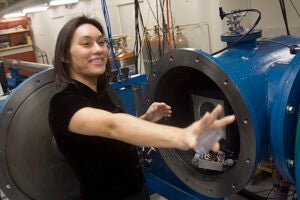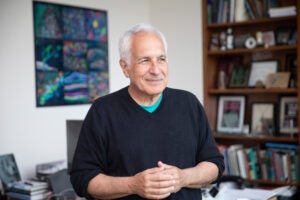Tag: Planetary Sciences
-
Science & Tech
Icebreaker
Every month, Sarah Stewart-Mukhopadhyay fires her 20-foot gun in the basement of Harvard’s Hoffman Lab, sending shivers through the concrete and steel structure that can be picked up by seismometers upstairs.

-
Campus & Community
Earth’s ‘Boring Billion’ Years Blamed on Sulfur-Loving Microbes
“If we really want to understand what’s happed in the history of Earth, we really have to understand this cross talk between the physical and biological processes,” says study coauthor Andrew Knoll of Harvard University.
-
Campus & Community
FAS names six full professors with tenure
From a professor of comparative literature to a professor of Chinese history, the FAS has announced six new tenured professors.
-
Science & Tech
Leadership Initiative Fellow Bolden nominated to lead NASA
Retired Marine Maj. Gen. and former astronaut Charles Bolden was nominated to be the head of NASA on Saturday (May 23), interrupting his stay at Harvard as anAdvanced Leadership Fellow.
-
Science & Tech
Kepler starts search for other Earths
As NASA’s Kepler space telescope this week begins scanning the Milky Way for planets that might harbor life, scientists at the Harvard-Smithsonian Center for Astrophysics (CfA) are keeping their fingers crossed and waiting for the data to start flowing.
-
Campus & Community
Jerry Mitrovica named geophysics professor
Theoretical geophysicist Jerry X. Mitrovica, whose studies of the Earth’s structure and evolution have important implications for our understanding of climate and sea-level changes throughout Earth’s history, has been named professor of geophysics in Harvard University’s Department of Earth and Planetary Sciences, effective July 1.
-
Science & Tech
Life in the universe? Almost certainly. Intelligence? Maybe not
We are likely not alone in the universe, though it may feel like it, since life on other planets is probably dominated by microbes or other nonspeaking creatures, according to scientists who gave their take on extraterrestrial life at Harvard last week.
-
Science & Tech
Cyclones spurt water into the stratosphere, feeding global warming
Scientists at Harvard University have found that tropical cyclones readily inject ice far into the stratosphere, possibly feeding global warming.
-
Campus & Community
Harvard astronomer Charbonneau honored with Waterman Award
David Charbonneau, the 34-year-old Thomas D. Cabot Associate Professor of Astronomy, has been named the recipient of the National Science Foundation’s 2009 Alan T. Waterman Award, and will receive $500,000 over a three-year period for scientific research or advanced study in his field.
-
Science & Tech
Milky Way bigger than thought
Our own Milky Way galaxy, long considered a “little sister” to the larger Andromeda Galaxy, is all grown-up, according to new research. The findings, presented at a Jan. 5 meeting of the American Astronomical Society in Long Beach, Calif., by Harvard-Smithsonian Center for Astrophysics (CfA) researchers, show that the galaxy has about 50 percent more…
-
Science & Tech
Riding — and reading — the Earth tide
Once a day, Miaki Ishii rides the Earth tide, rising slowly — along with her desk, chair, and entire office — 20 to 30 centimeters before sinking back again.
-
Science & Tech
Researchers study glaciers on Earth’s coldest desert
It’s December, and undergraduate Jenny Middleton bundles up to face the cold. While all across campus, students, and faculty don their winter gear, Middleton is not preparing for the New England winter; she is preparing for an expedition through the Earth’s coldest desert: the McMurdo Dry Valleys in Antarctica.
-
Science & Tech
Climate options must include ‘all of the above’
Climate change has so much momentum behind it that “either/or” discussions about options are meaningless because it’ll take all we can do just to arrest carbon dioxide at levels double those in preindustrial times, a top climate scientist said Dec. 11.
-
Science & Tech
Arctic ice is thinning steadily
There was a polar bear sighting at Harvard last week. At Pforzheimer House on Thursday (Oct. 2), global warming expert James J. McCarthy delivered a crisp summary of how fast ice is melting in the Arctic — and why we should care. The audience of 80 took in his companion slide show, including images of…
-
Science & Tech
A new era in search for ‘sister Earths’?
Research presented at a recent astronomical conference is being hailed as ushering in a new era in the search for Earth-like planets by showing that they are more numerous than previously thought and that scientists can now analyze their atmospheres for elements that might be conducive to life.
-
Science & Tech
Mars’ water appears to have been too salty to support life
A new analysis of the Martian rock that gave hints of water on the Red Planet — and, therefore, optimism about the prospect of life — now suggests the water was more likely a thick brine, far too salty to support life as we know it. The finding, by scientists at Harvard University and Stony…
-
Science & Tech
Laser precision to help find new Earths
Harvard scientists have unveiled a new laser-measuring device that they say will provide a critical advance in the resolution of current planet-finding techniques, making the discovery of Earth-sized planets possible.
-
Science & Tech
Interdisciplinary conference takes micro, macro look at origins of life
How did we get here? That’s not the first line in a hangover joke. It’s a question that has been asked for centuries about the origins of life on Earth. At Harvard last week, an A-list of astronomers, physicists, Earth scientists, and chemists met in the Radcliffe Gymnasium to look at this and other fundamental…
-
Health
Lava provides window on early Earth
Researchers at Harvard and the University of Hawaii believe they’ve resolved a long-standing controversy over the roots of islands — volcanoes in the middle of tectonic plates — showing that the islands’ lava provides a window into the early Earth’s makeup.
-
Science & Tech
Digging for solutions to energy crisis
In the 1970s, Iceland was one of the poorest countries in Europe. Today it is one of the richest, with a per capita GDP higher than that of Denmark, from which it won full independence in 1944.
-
Science & Tech
Visualization Lab provides data in three dimensions
On the second floor of the Peabody Museum, in a darkened room painted flat black, Harvard geologist John Shaw slips on a pair of futuristic goggles as he sits before a 23-foot-wide wrap-around screen.
-
Science & Tech
Deep-sea sediments could safely store man-made carbon dioxide
An innovative solution for the man-made carbon dioxide fouling our skies could rest far beneath the surface of the ocean, say scientists at Harvard University. They’ve found that deep-sea sediments could provide a virtually unlimited and permanent reservoir for this gas that has been a primary driver of global climate change in recent decades, and…


